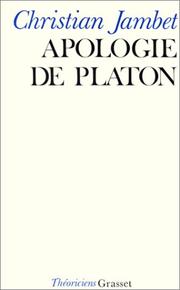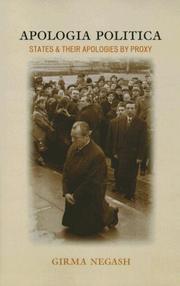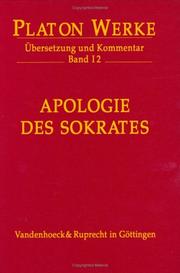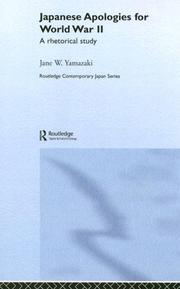| Listing 1 - 10 of 56 | << page >> |
Sort by
|

ISBN: 2246004128 9782246004127 Year: 1976 Publisher: Paris: Grasset,
Abstract | Keywords | Export | Availability | Bookmark
 Loading...
Loading...Choose an application
- Reference Manager
- EndNote
- RefWorks (Direct export to RefWorks)
Plato --- Socrates --- Plato - Apology
Book
ISBN: 2296094694 9782296094697 Year: 2009 Publisher: Paris: L'Harmattan,
Abstract | Keywords | Export | Availability | Bookmark
 Loading...
Loading...Choose an application
- Reference Manager
- EndNote
- RefWorks (Direct export to RefWorks)
La littérature apologétique liée au procès de Socrate, et celle due à Platon en tout premier lieu, a transmis avec beaucoup de force aux siècles à venir l'image d'un personnage dépassant son temps, frappé d'une condamnation entièrement injuste. L'analyse de l'Euthyphron et de l'Apologie de Socrate proposée dans ces pages s'appuie sur le fort lien thématique des deux textes : Platon y revient sur les circonstances du procès d'impiété intenté à son maître et met en discussion le sujet de la piété par deux démarches différentes mais complémentaires. L'Euthyphron défend la conception de la piété de Socrate à travers un débat philosophique avec un interlocuteur spécialisé dans les questions religieuses. L'Apologie défend le mode de vie de Socrate en présentant ses repères essentiels et sa signification, en l'envisageant comme une illustration de la vie pieuse. La lecture couplée des deux textes veut identifier les éléments qui permettent de reconstituer l'attitude - les croyances, la pensée, l'action - du Socrate platonicien en matière de piété et de capter sa spécificité.
Book
ISBN: 0691019002 9780691019000 Year: 1995 Publisher: Princeton, N.J. : Princeton University Press,
Abstract | Keywords | Export | Availability | Bookmark
 Loading...
Loading...Choose an application
- Reference Manager
- EndNote
- RefWorks (Direct export to RefWorks)
Plato. --- Socrates --- Socrates. --- Apology (Plato).

ISBN: 0739122061 073915205X 9780739152058 0739110942 9780739110942 Year: 2006 Publisher: Lanham, Maryland : Lexington Books,
Abstract | Keywords | Export | Availability | Bookmark
 Loading...
Loading...Choose an application
- Reference Manager
- EndNote
- RefWorks (Direct export to RefWorks)
Chapter 1 The Problematic of Political Apology Chapter 2 German-Jewish (Israeli) Relations: From Zealous Accountability to Belated Apology Chapter 3 A Political Calculus of Apology: Japan and Its Neighbors Chapter 4 Voices and Silences in Mourning Rwanda Chapter 5 Diplomacy and Crocodile Tears: U.S. Apologies to China Chapter 6 The Limits and Potential of Political Apologies Chapter 7 Bibliography Chapter 8 Index
Apologizing --- Apology (Psychology) --- Social interaction --- Political aspects.
Book
ISBN: 8021084529 9788021084520 9788021080560 Year: 2016 Publisher: Brno, [Czech Republic] : Masaryk University,
Abstract | Keywords | Export | Availability | Bookmark
 Loading...
Loading...Choose an application
- Reference Manager
- EndNote
- RefWorks (Direct export to RefWorks)
Apologizing --- Apology (Psychology) --- Social interaction --- Political aspects.

ISBN: 3525304013 9783525304013 Year: 2004 Volume: I, 2 Publisher: Göttingen Vandenhoeck und Ruprecht
Abstract | Keywords | Export | Availability | Bookmark
 Loading...
Loading...Choose an application
- Reference Manager
- EndNote
- RefWorks (Direct export to RefWorks)
Sokrates ist eine singuläre Erscheinung. In der Geschichte der Philosophie hat niemand einen solchen Einfluss gehabt wie er. Dabei war er überzeugt, in den für menschliches Leben wichtigen Fragen nichts zu wissen, und hat selbst über seine Überlegungen keine einzige Zeile geschrieben. Seine Wirkung beruht allein auf den Diskussionen, in die er seine Mitbürger verwickelte, um ihnen klar zu machen, dass sie nicht das täten, was sie tun müssten, wenn sie ein glückliches Leben führen wollten. Trotz seines grundsätzlichen Nichtwissens ließ er sich allerdings von zwei Überzeugungen leiten, die nicht erst heute paradox klingen: »Niemand tut freiwillig Unrecht« und »Unrecht tun ist schlimmer als Unrecht leiden«. Äußerlich gesehen ist er gescheitert: Nach einem verlorenen Krieg wurde er Opfer konservativer Tendenzen und ist im Jahre 399 v. Chr. im Alter von 70 Jahren als Verderber der Jugend hingerichtet worden. Damals war Platon, der sich ihm angeschlossen hatte, 28 Jahre alt. Etwa 15 Jahre später ist er nicht nur als Autor sokratischer Dialoge bekannt geworden, sondern hat auch als eine Art höherer Lehranstalt die ›Akademie‹ gegründet. Er beschließt rückschauend, von diesem Mann, der ihn fasziniert und geprägt hat, ein Bild zu entwerfen, indem er ihm eine Verteidigungsrede in den Mund legt, die Sokrates hätte halten müssen, wenn er die Absicht gehabt hätte, vor Gericht ein wahres Bild von sich zu geben.Dieses Buch gibt eine neue Übersetzung und versucht, den etwa 2400 Jahre alten Text dem heutigen Leser durch philologische, historische und thematische Erläuterungen verständlich zu machen.
Philosophy --- Socrates --- Plato --- Philosophy - Early works to 1800 --- Plato - Apology
Book
Abstract | Keywords | Export | Availability | Bookmark
 Loading...
Loading...Choose an application
- Reference Manager
- EndNote
- RefWorks (Direct export to RefWorks)
eebo-0198

ISBN: 0198239386 0198244665 9780198244660 Publisher: Oxford : Clarendon Press.
Abstract | Keywords | Export | Availability | Bookmark
 Loading...
Loading...Choose an application
- Reference Manager
- EndNote
- RefWorks (Direct export to RefWorks)
Philosophy, Ancient. --- Philosophie ancienne --- Socrates. --- Plato --- Socrates --- Trials, litigation, etc. --- Plato. Apology. --- Socrates - Trials, litigation, etc.
Book
ISBN: 9789042933705 9042933704 Year: 2017 Volume: 7 Publisher: Leuven Paris Bristol, CT Peeters
Abstract | Keywords | Export | Availability | Bookmark
 Loading...
Loading...Choose an application
- Reference Manager
- EndNote
- RefWorks (Direct export to RefWorks)
This study explores the so-called 'Apology of Aristides' as it can be found within Barlaam and Ioasaph (B&I). Scholars have started from the hypothesis (when comparing the Greek B&I version to the Syriac version) that the redactor of B&I has removed details from within the 'Apology'. Although this has a prima facie probability, no scholar has addressed whether this one hundred year old hypothesis holds any truth. In order to understand a text within a framing text, one needs to get a clear idea of the latter, especially its textual form and its core ideas. This allows an insight into the relationship between the two entities. I ask which elements of the 'Apology entered B&I and have been seen as fitting this framework, which of the linguistic entities and theological ideas are consistent with both the time and content of B&I, and how the 'Apology' reads as part of the overall narrative of the B&I. I explore the role played by this 'added' text in B&I, and why the author or redactor may have chosen to use it. Furthermore, is this text the only fragment that was added to B&I? Once the 'text' of the 'Apology' is understood in its frame, I argue, can we examine how that frame may have impacted on the interpretation of the 'Apology', and whether and to what extent it may have impacted on the text itself. This answer to the latter question may already have been suggested when looking at how the linguistic entities fit the B&I frame. Finally, I compare the 'Apology' of the B&I with the older Greek papyri of the 'Apology'. A study such as this has never been accomplished, and yet such a study proves essential in understanding the Greek version of the 'Apology', as it appears in B&I, and how this new information relates to the other versions of the 'Apology'. What we discover is that the redactor has not changed much of the B&I version of the 'Apology' contrary to what previous scholarship suggets.

ISBN: 1280450851 9786610450855 0203002059 9780203002056 0415355656 9781134253463 9781134253500 9781134253517 9780415355650 9780415649377 Year: 2006 Publisher: London New York Routledge
Abstract | Keywords | Export | Availability | Bookmark
 Loading...
Loading...Choose an application
- Reference Manager
- EndNote
- RefWorks (Direct export to RefWorks)
Post-war Japan offers a compelling case study of national apologies for past wrongdoings. Actions of the Japanese Army and government during the Second World War caused enormous suffering and distress throughout Asia, leaving a legacy of resentment and distrust. Beginning in the mid-1980s, apology for wartime actions became a recurring issue for Japan. Repeated calls for apology from various quarters as well as repeated apologies by Japanese officials provide a rich source for the study of national apology and how public apology discourse develops over time. Unlike most rhetorical st
Apologizing. --- World War, 1939-1945 --- Apology (Psychology) --- Social interaction --- Japan --- Foreign relations
| Listing 1 - 10 of 56 | << page >> |
Sort by
|

 Search
Search Feedback
Feedback About UniCat
About UniCat  Help
Help News
News